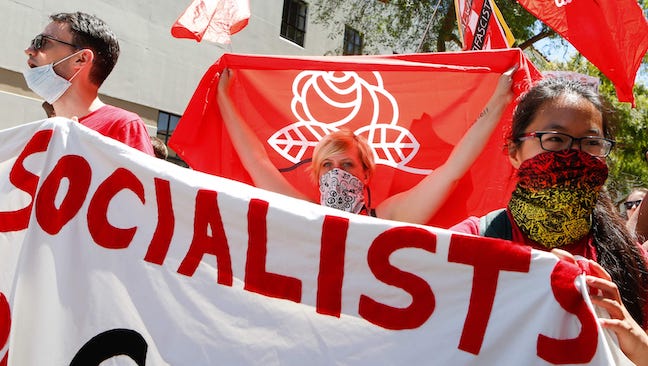Socialist Countries and Welfare States
Catholic Social Teaching and ‘Moderate’ Socialism
by CAPP-USA
What Countries are Socialist?
This may be a familiar scenario: A few friends or co-workers are discussing economics or politics, and someone asks, “What is a “socialist” country? Are Scandinavian countries, like Sweden, socialist? What about Canada? Is Canada socialist?”

Socialist countries and Social Democracies: Does the Church have a “position”?
Someone might argue these are ‘democratic socialist’ counties or ‘social democracies’ — the perfect combination of free market capitalism and socialism.
You might hear someone say the “Nordic Model” is ideal; providing for a thriving economy while also ensuring education, healthcare, labor, etc. are protected.
Does the Catholic Church have anything to say about the best economic systems?
The Church tells us there is little difference between “even moderate forms of socialism” and unbridled capitalism!
What is Socialism?
First, we must always define our terms. Classic socialism, popularized by Karl Marx, is presented as a transitional economic system between capitalism and communism. Its aim is for state control and ownership of the means of production. People will then share equally in the outputs of the system.
The Church teaches this socialism “must be utterly rejected, since it only injures those whom it would seem meant to benefit, is directly contrary to the natural rights of mankind, and would introduce confusion and disorder into the commonweal.” (Rerum Novarum, 24)
Pope St. John Paul II, all too familiar with socialist and communist regimes, stated that under socialism, freedom “is replaced by a burdensome system of bureaucratic control which dries up the wellsprings of initiative and creativity”. (Centesimus Annus, 25)
Is Sweden Socialist?
By the definition given above, Sweden, Norway, Denmark, Germany – indeed no European country is socialist. So, is Canada socialist?
No. So the question becomes…
Read more about the Church’s consistent opposition to Socialism here
Are they Democratic Socialist Countries?
Again, we must define our terms. Democratic Socialists typically advocate for the government to provide a range of basic services, such as health care and higher education, for free or at a significant discount, and/or for government control of vast sectors of the economy – in order to ameliorate perceived “ills” (climate change, income inequality, etc.).
By this definition Sweden, Norway, Denmark, Germany – indeed, most European countries, Canada and, to an extent, all countries (USA included) exist somewhere on a spectrum so defined.
However, all these countries also enjoy free market, capitalist economies.
Their differences are not in their capitalism. Rather, they differ in their tax and spending policies. Higher taxes typically equating to broader and/or deeper social spending policies.
Sweden, Denmark, Norway, Germany – most European countries – have high taxes compared to the USA and larger social welfare programs – variously including free healthcare, education including university, and extensive public amenities.
While it is complicated, Canada seems to enjoy lower taxes than in the USA and have a free national healthcare system and many social welfare programs.
Does the Church Suggest the Ideal “Position” On this Spectrum?
No. But the Church warns of the extremes:
Welfare States
“By intervening directly and depriving society of its responsibility, the Social Assistance State leads to a loss of human energies and an inordinate increase in public agencies which are dominated more by bureaucratic ways of thinking than by concern for serving their clients, and which are accompanied by an enormous increase in spending. In fact, it would appear that needs are best understood and satisfied by people who are closest to them and who act as neighbors to those in need”. (Pope St. John Paul II, 48)
“Individuals and groups have the right to go their own way, even though they may sometimes make mistakes. In full respect for that freedom, civil society is called to help each person and social organization to take up its specific role and thus contribute to the common good.” (Pope Francis)
“No actual or established power has the right to deprive peoples of the full exercise of their sovereignty.” (Pope Francis, 3.2)
Unbridled Capitalism
The Church tells us there is little difference between “even moderate forms of socialism” and unbridled capitalism!
Indeed, “Insofar as it [Unbridled Capitalism] denies an autonomous existence and value to morality, law, culture and religion, it agrees with Marxism, in the sense that it totally reduces man to the sphere of economics and the satisfaction of material needs.” (Pope St. John Paul II, 19)
Just like socialism, unbridled capitalism is an “ideological rejection…oblivious to the Creator and at risk of becoming equally oblivious to human values…A humanism which excludes God is an inhuman humanism.” (Pope Benedict XVI, 78)
What Does the Church Propose?
“The church does not have technical solutions to offer and does not claim ‘to interfere in any way in the politics of states’. (Populorum Progressio, 13).” (Pope Benedict XVI, 9)
But the Church has “clearly outlined the guiding principles [Human Dignity, Solidarity, Subsidiarity] which, while susceptible of varied concrete applications according to the diversified conditions of times and places and peoples, indicate the safe way of securing the happy progress of society.” (Pope Pius XI, 34)
“Our duty is to continue to insist…that the human person and human dignity are not simply catchwords, but pillars for creating shared rules and structures”. (Pope Francis, 2)
“The greatest service to development, then, is a Christian humanism that enkindles charity and takes its lead from truth, accepting both as a lasting gift from God. Openness to God makes us open towards our brothers and sisters and towards an understanding of life as a joyful task to be accomplished in a spirit of solidarity.” (Pope Benedict XVI, 78)





